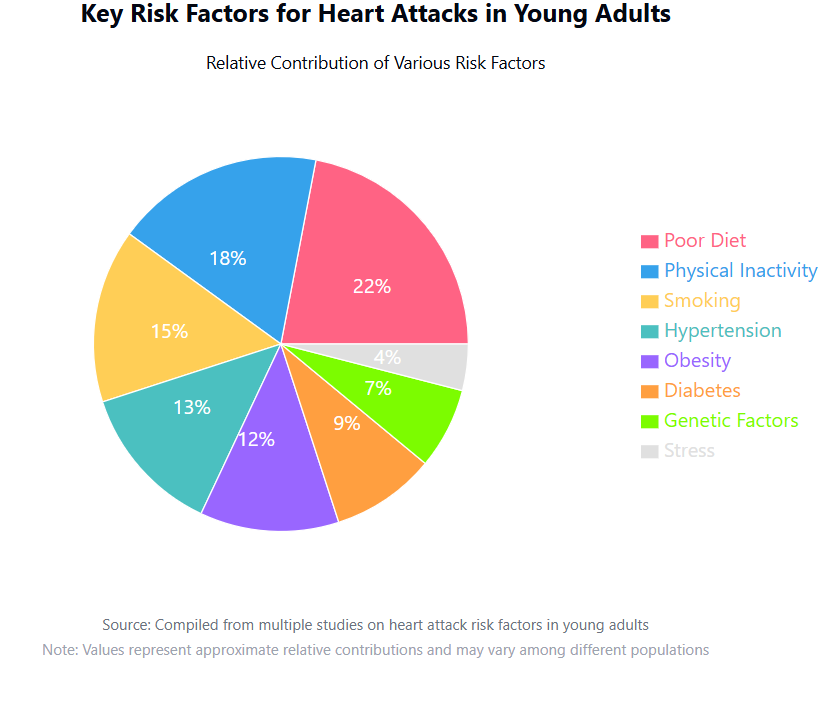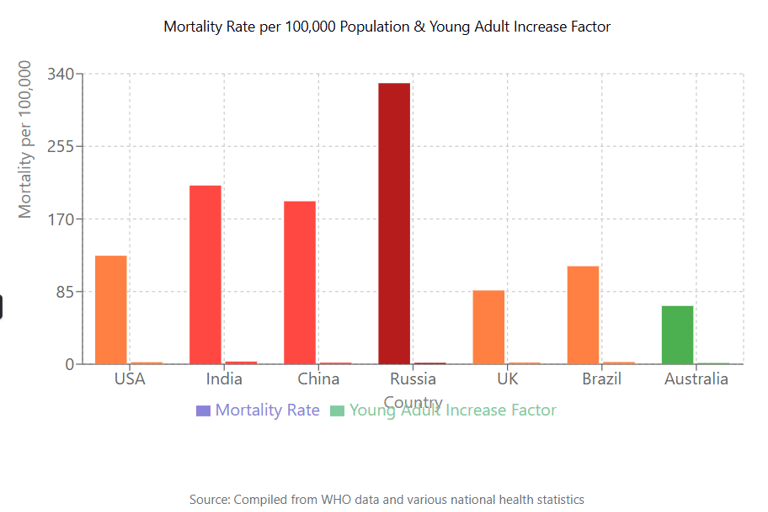Why Are Heart Attacks Increasing Among Young Adults? Causes & Prevention Tips
Think heart attacks are just your grandparents' worry? Think again! Young adults—in their 20s, 30s, and 40s—are increasingly facing heart trouble, thanks to modern life's cozy traps: fast food, stress overload, Netflix marathons, and even genetics. But don't panic yet! In this article, you'll discover why more young people are experiencing heart attacks, what sneaky symptoms might fool you (hint: it's not always "just bad pizza"), and practical steps to keep your heart happy (without giving up everything fun). Stick around—we'll debunk myths, drop some jaw-dropping stats, and make sure you know exactly how to dodge the heart-attack club.
HEALTH SIMPLIFIED
4/7/20255 min read


When you hear "heart attack," you probably picture your grandparents' generation clutching their chest in dramatic movie scenes. Unfortunately, heart attacks aren't just an "older person's problem" anymore. Increasingly, people in their 20s, 30s, and 40s are experiencing them too. What's going on? Is life trying to scare us even earlier now? Let’s simplify this, skip all the confusing medical jargon, and have a real talk about why young adults are having heart attacks—and more importantly, how you can avoid joining that club.
What Exactly Is a Heart Attack, Anyway?
Imagine your heart as a hardworking engine that needs fuel (oxygen-rich blood) constantly flowing through its pipes (arteries). If something clogs up these pipes—usually fatty plaque and blood clots—the blood can't reach part of the heart, starving the muscle of oxygen. This situation is called a heart attack, or if you want to impress friends at a dinner party, a myocardial infarction. But trust me, stick with "heart attack" unless you're chatting up a cardiologist.
(By the way, cardiac arrest is different—that’s when your heart just decides to stop altogether, like suddenly unplugging a machine.)
But I’m Too Young! Right?
We used to think youth gave us a pass on heart troubles—eat pizza, watch Netflix marathons, skip workouts, no worries, right? Not exactly. Heart attacks among young people have sharply risen worldwide. Recent studies found nearly 1 in 5 heart attacks hit people under 40, with numbers growing each year. Even scarier, during COVID, heart attack deaths among adults aged 25–44 surged by about 30%. Clearly, your heart doesn’t check your birth date before having issues.
And India isn't immune. Heart problems tend to show up about 10 years earlier in Indians than in Western populations. In fact, about half of all heart attacks in India happen to people under age 50. You’ve probably noticed news stories lately of seemingly healthy Indian actors and celebrities suffering sudden heart attacks in their 30s and 40s. It’s alarming—and a good wake-up call.
Warning Signs: “Am I Having a Heart Attack, or Just Bad Pizza?”
Young people often dismiss heart attack symptoms, assuming they're just indigestion or stress. So let’s make this easy—here’s how to tell it might be a heart attack:
Chest discomfort: Feels like pressure, squeezing, or heaviness—like an elephant decided your chest looked comfortable. Usually lasts a few minutes or comes and goes.
Pain that travels: The pain might venture from your chest to your arms (especially the left one), neck, jaw, or back. If your upper body is suddenly having a pain party, that’s a red flag.
Shortness of breath: Suddenly gasping for air without reason, even at rest.
Other signals: Cold sweats, nausea, dizziness, or sudden extreme tiredness.
Important: If you or someone near you has these symptoms, do not wait around arguing about it. ("I'm too young, it's probably nothing," is a terrible last sentence.) Call emergency services immediately. Quick action can literally save lives.
Why Are Young Hearts Under Attack?
Blame modern life, stress, and our Netflix-and-fast-food habits. Here’s the shortlist of suspects causing heart troubles early in life:
The Junk Food Saga: Diets rich in fats, sugars, and salts (you know, all the tasty stuff) clog arteries and raise cholesterol. Obesity and early-onset diabetes are also stepping into the spotlight as villains here.
The Sofa-Life Epidemic: If your couch has a permanent imprint of your body, that's a bad sign. Sedentary lifestyles mean weaker hearts and poorer health overall.
The Smoking & Vaping Trap: Smoking—even occasionally—can cause serious harm to your arteries. And yes, vaping and second-hand smoke count too. Sorry, not sorry.
Alcohol & Recreational Drugs: Party all weekend? Too much alcohol and stimulants like cocaine or amphetamines can cause heart issues even in otherwise fit young adults.
Stress Monster: Young adulthood comes with stress: tough jobs, relationship drama, exams, student loans—take your pick. Chronic stress leads to higher blood pressure and other damaging effects on your heart.
“But My Family…” Genetics: If heart trouble runs in your family, you're already signed up for extra caution. Family history isn't destiny, but it means you should be extra careful.
Post-COVID Complications: COVID-19 left behind inflammation and increased clotting risk, possibly triggering heart attacks even in young people who had mild infections.
Many of these causes team up—like stress driving you to eat unhealthy comfort food, worsening your health even faster. The good news? Most risk factors are controllable.
Preventing Heart Attacks: Keep Your Heart Happy
Luckily, heart attacks are often preventable. Here’s a quick checklist to keep your ticker ticking happily:
Eat heart-smart: Choose whole foods, veggies, fruits, lean proteins. Treat fast food as an occasional visitor, not a permanent roommate.
Get moving: Aim for 30 minutes of activity each day. Walking counts, dancing counts, even chasing after your pet counts (just don’t cheat).
Quit smoking (yes, really): It’s 2024. Smoking isn’t cool anymore, and your arteries absolutely hate it.
Easy on alcohol: If you drink, moderation is key. Heavy drinking hurts your heart.
Relax! Seriously, lower your stress. Yoga, meditation, video games, petting dogs—whatever helps you unwind.
Watch your numbers: Regular check-ups can catch high blood pressure, cholesterol, or diabetes early—before your heart gets mad.
Know family secrets: If heart problems run in your genes, inform your doctor. Extra caution could save your life.
Gym smartly: Ease into workouts gradually. Be cautious with random supplements or extreme fitness trends. Nobody needs superhero abs badly enough to damage their heart.
Just say no to drugs: Recreational drugs can kill your fun permanently. Avoid the temptation.
A Note About Protein Powders & Supplements
Protein shakes and powders aren’t automatically evil, but be careful—excessive or unregulated use can harm your heart. Always choose reliable brands, stick to recommended doses, and discuss any concerns with a professional. Remember, your heart prefers actual food, not powdered mystery ingredients.
Final Thoughts: Love Your Heart Now, Thank Yourself Later
Heart attacks in young people aren't just scary headlines—they’re reality. But here's the silver lining: you have tremendous control over your heart’s health. Little changes, like choosing salad over fries sometimes or taking regular walks, can hugely impact your heart. Your heart will thank you—and future-you will thank you too.
Life is stressful enough without adding heart attacks into the mix. Stay informed, stay proactive, and above all, show your heart some love. After all, it's working hard for you every single beat—might as well keep it happy.
Quick Facts: Did You Know?
Every 40 seconds, someone in the U.S. has a heart attack—yep, that's about the time it takes to microwave popcorn!
Heart attacks aren't picky about age anymore: from 2000 to 2016, heart attack rates in people under 40 rose by roughly 2% every single year.
"Silent heart attacks" exist (no, it's not ninja training): Around 1 in 5 heart attacks occur without obvious symptoms, quietly damaging the heart unnoticed.
During the COVID-19 pandemic, deaths from heart attacks among young adults aged 25–44 jumped nearly 30%. Apparently, stress-baking wasn't enough to protect our hearts.
Even in your 20s, the risk isn't zero: About 2 out of every 100,000 people aged 20–29 experience heart attacks annually, increasing dramatically to nearly 17 per 100,000 by ages 30–39.
Obesity is also joining the party early. Between 2009–2010 and recent years, obesity among young adults jumped from 32.7% to nearly 41%. (Maybe it's time to rethink that "fries-with-everything" philosophy.)
Although the average age of a first heart attack is around 66 for men and 72 for women, younger hearts aren't safe—about half of heart attacks in India affect people under 50!




Learn
Explore topics made easy for everyone here.
Share
© 2025. All rights reserved.
